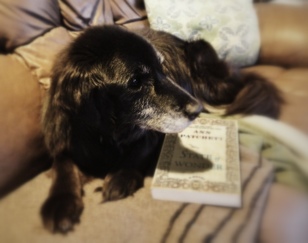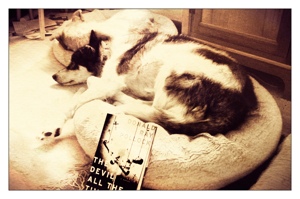
Yetch.
I couldn’t bring myself to waste any more time on Alan Hollinghurst’s The Stranger’s Child, suffering all the way through the first two parts. I must be missing something, since it was selected for the Tournament of Books and was supposedly a surprise omission from the Booker short list. Maybe I’ve reached my tolerance threshold for upper crust English families and the irrelevancies of their pampered lives. Hollinghurst simply didn’t give me any reason to care about the characters, possibly because we know them from their inane dialog and their restrained physical activity (sitting around, mostly), and I couldn’t find a meaningful plot or conflict that made me want to start reading again after I had put it down.
I had the same reaction after watching the first episode of Downton Abbey, but by the second episode, it had won me over. Great characters, interesting plot, believable dialog. Things I wish I had found in this book.
Sitting on the couch watching the Giants v. 49ers, I heard a hissing noise coming from the bathroom—and not the kind that comes from battling cats. When I went to look, there was hot water and steam spraying out of the hot water supply line coming out of our water heater. We’ve got a copper line coming out of the heater into a T-fitting that supplies hot water to a heat exchanger that circulates glycol on the other side of the exchanger to keep our water and septic lines thawed. After that is a Shark Bite connector holding the main PEX hot water line to the house. The leak was coming from just above the connector, underneath some red electrical tape I had always assumed was to indicate “hot,” but may have been there to disguise an injury to the tubing. I don’t know how else to explain PEX suddenly springing a leak, and the contractor that did the original work has a very bad reputation around Fairbanks for doing much less than the “Best.”
At the Fair this summer we stopped at the booth advertising Rescue Tape and bought a couple rolls. It's a silicone “tape” that bonds with itself when stretched, and can supposedly handle very high pressures and temperatures. I’m very glad we did. I wrapped a foot-long section around the leak, and for now, it’s holding. If you don’t have a roll of this stuff around, you may want to get one for a similar emergency.

Nika, State of Wonder
State of Wonder, by Ann Patchett, is another number one seed in the Tournament of Books, and it deserves it’s high ranking. It is the story of Marina, a medical researcher working for a large pharmaceutical company, sent into the Amazon in search of her former medical school mentor to determine the progress they have made researching a fertility drug. She is also trying to find out what happened to her office mate, who apparently died on a similar mission after months in the jungle.
It’s a great book; well written, surprising, and suspenseful. The way the jungle is described through the eyes of Mariana perfectly captures the wild other-worldliness of it, as well as her gradual understanding and acceptance of the situation she is in. The lead scientist on the project (and Marina’s former mentor), Dr. Annika Swenson, is also a great character, especially seen through the eyes of Marina. Dr. Swenson is one of those people that always seem to have a perfect handle on every situation; seeing several steps ahead and knowing exactly what to say in order to both resolve the issue and make one feel foolish for not seeing it.
The book faces off against one of my favorites, Patrick deWitt’s The Sisters Brothers. It will be very interesting to read judge Wil Wheaton’s logic when he makes his decision. It’s close enough in my mind that I can’t make up my mind at this moment.
It was -25°F at the house, but the sun was out and I couldn’t resist going for a ski. Goldstream Creek has been going through an extended period of overflowing for most of the winter, so I wasn’t sure how far I would get. I skied on the Valley trail toward Ballaine Road, turned down the hill at the DNR pond, and skied west (sort of!) on the Creek until it met up with the power line trail. I took that trail east until connecting to the trail up the hill to Shadow Lane. Then down Shadow to the edge of our Miller Hill property and back down to the Valley trail. It was 3.5 miles, and polar wax was just about right. The sun, snow and trail conditions made it a great ski. I’m sure the two people skijouring with their dogs and the musher I crossed paths with will agree.
Here’s a panorama taken from a location close to the photo to the right (click on either for a larger version).
Another Tournament of Books pick, The Devil All the Time meets the last book I read (Julian Barnes’s The Sense of an Ending) in the first round. They are such totally different books that I wonder how judge Emma Straub can possibly decide between the two. Devil is about hard lives and evil, taking place on the other side of the tracks in towns in Ohio and West Virginia. There aren’t any characters in the book that you’d want to meet, and if you did, you’d either need to be carrying a firearm to survive the encounter, or would want a shower after the experience. One reviewer commented that reading this book was like “wrestling a grizzly.” I know someone that has actually done that (not her choice), and I doubt if she would equate the two.
In many ways, it reminded me of Stephen King’s 11/22/63, except without the hero protagonist trying to make the world a better place by murdering Oswald. The brutality and poverty also recalled Matthiessen’s fantastic Shadow Country.
It’s an excellent book, if you can handle it. It isn’t one of my picks to win the tournament, but I wouldn’t be disappointed if it did. How it fares against Ending in round one probably depends on how much the judge hated the ending of Barnes’s book compared with feeling beaten down by Devil. I think I’d pick Devil, but it’s close.



